Trapping Zero Read online
Page 4
“I didn’t mean to upset her…”
Maya spun on him with her hands on her hips. “Then why did you go and bring that up?”
“Because she’s hardly said two words to me about it!” Reid said defensively. “I want her to know that she can talk to me.”
“She doesn’t want to talk to you about it,” Maya shot back. “She doesn’t want to talk to anyone about it!”
“Dr. Branson said that opening up about a past trauma is therapeutic…”
Maya scoffed loudly. “And do you think that Dr. Branson has ever been through anything like what Sara went through?”
Reid took a breath, forcing himself to calm and not argue. “Probably not. But she treats CIA operatives, military personnel, all manner of trauma and PTSD—”
“Sara is not a CIA agent,” said Maya harshly. “She’s not a Green Beret or a Navy Seal. She’s a fourteen-year-old girl.” She ran her fingers through her hair and sighed. “You want to know? You want to talk about what happened? Here it is: we saw Mr. Thompson’s body before we were kidnapped. It was lying right there in the foyer. We watched that maniac cut the throat of the woman from the rest stop. Some of her blood was on my shoes. We were there when the traffickers shot another girl and left her body lying in the gravel. She was trying to help me free Sara. I was drugged. We were both nearly raped. And Sara, somehow she found the strength to fight off two grown men, one of whom had a gun, and she threw herself out of the window of a speeding train.” Maya’s chest was heaving by the time she was finished, but no tears came.
She wasn’t upset reliving the events of last month. She was angry.
Reid lowered himself slowly into a chair. He knew about most of what she told him by virtue of having followed the trail to find the girls, but he had no idea about another girl being gunned down in front of them. Maya was right; Sara was not trained to deal with any such things. She wasn’t even an adult. She was a teenager who had experienced things that anyone, trained or not, would find traumatizing.
“When you showed up,” Maya continued, her voice lower now, “when you actually came for us, it was like you were a superhero or something. At first. But then… when we had some time to think about it… we realized that we don’t know what else you’re hiding. We’re not sure who you really are. Do you know how frightening that is?”
“Maya,” he said gently, “you don’t ever have to be afraid of me—”
“You’ve killed people.” She shrugged one shoulder. “Plenty of them. Right?”
“I…” Reid had to remind himself not to lie to her. He had promised he wouldn’t anymore, as long as he could help it. Instead he only nodded.
“Then you’re not the person that we thought you were. That’s going to take time to get used to. You need to accept that.”
“You keep saying ‘we,’” Reid murmured. “She talks to you?”
“Yeah. Sometimes. She’s been sleeping in my bed the past week or so. Nightmares.”
Reid sighed dolefully. Gone was the untroubled, content dynamic their small family had once enjoyed. He realized now that things had changed for all of them and between all of them—maybe forever.
“I don’t know what to do,” he admitted softly. “I want to be there for her, for both of you. I want to be your support when you need it. But I can’t do that if she won’t talk to me about what’s going on in her head.” He glanced up at Maya and added, “She’s always looked up to you. Maybe you can be a role model for her now. I think that getting back into a routine, a shot at normal life, would be good for both of you. At least finish your Georgetown classes. Besides, they’re not likely to let you in if you flunked an entire semester.”
Maya was silent for a long moment. At last she said, “I don’t think I want to go to Georgetown anymore.”
Reid frowned. Georgetown had been her top choice of colleges since they’d moved to Virginia. “Then where? NYU?”
She shook her head. “No. I want to go West Point.”
“West Point,” he repeated blankly, completely thrown by her statement. “You want to go to a military academy?”
“Yes,” she said. “I’m going to become a CIA agent.”
CHAPTER FOUR
Reid balked. He was certain he had heard her right, but the combination of words that came from her mouth made little sense to him.
She’s winding me up, he thought. She was expecting an argument and I resisted. This was just youthful angst. It had to be.
“You… want to be a CIA agent,” he said slowly.
“Yes,” said Maya. “More specifically, I want to attend the National Intelligence University in Bethesda. But in order to do that, I would first have to be a member of the armed forces. If I go to West Point instead of enlisting, I would graduate as a second lieutenant and be eligible to attend NIU. There I can get a master’s in strategic intelligence, and by that point I’d be over twenty-one, so I could enroll in the agency’s field-training program.”
Reid’s legs felt numb. Not only was she very obviously serious, but she had already done some thorough research to find her best course of action and education.
But there was no way in hell that he would ever let his daughter choose that path.
“No,” he said simply. All other words seemed to fail him. “No. No way. That’s not happening.”
Maya’s eyebrows shot up in unison. “Excuse me?” she said sharply.
Reid took a deep breath. She was headstrong, so he would have to deny her more carefully than that. But his answer was an unequivocal and emphatic “no.” Not after everything he had seen and everything he had done.
“It hasn’t been all that long since… the incident,” he said. “It’s still fresh in your mind. Before you make a decision like this, you need to consider all angles. Finish your classes. Graduate high school. Apply to colleges. And we can revisit all of this later.” He smiled as pleasantly as he could muster.
Maya did not. “You don’t get to dictate my life like that,” she said heatedly.
“Actually, I do,” Reid countered. He was quickly growing irritated himself. “You’re still a minor.”
“Not for long,” she shot back. “Let me tell you what’s going to happen. I’m not going back to those classes at Georgetown. In fact, I’m not going back to school until September. I’ll flunk my spring semester and I’ll have to take all those courses over again. I’ll be seventeen next month, which means by the time I graduate I’ll be eighteen. And then you don’t get to tell me where I can go or what I can do anymore.” She folded her arms to punctuate her point.
Reid pinched the bridge of his nose. “You cannot just skip three months of school. And what about all these study sessions you’ve been doing? All that time would be wasted.”
“I haven’t been going to study sessions,” she admitted.
He looked up at her sharply. “So you’ve been lying to me? After everything?” He scoffed in dismay. “Then where have you been going?”
“After you drop me off, I go to the rec center,” she told him matter-of-factly. “There’s a self-defense class there a few times a week. It’s taught by a former Marine. I’ve also been reading up on counterintelligence and espionage tactics.”
He shook his head. “I can’t believe this. I thought we weren’t going to have any more secrets between us.” Even as he said it, a painful memory flashed through his mind—Kate’s murder, the truth about their mother. He still hadn’t told them, despite his promise to himself to cease the lying and guile. It killed him to keep it from them, but in the wake of the incident it had been too soon to reveal something so horrible. Now, four weeks later, he was afraid it was too late and that they would be angry at him for keeping it to himself for so long.
“I knew you’d react like this,” Maya said. “That’s why I didn’t tell you the truth. But I’m telling you now. That’s what I want to do. That’s what I’m going to do.”
“When you were seven you wanted to be a ballet dancer,” Reid
told her. “Remember that? When you were ten you wanted to be a veterinarian. At thirteen you wanted to be a lawyer, all because we watched a movie about a murder trial—”
“Do not patronize me!” Maya leapt up from her seat, standing in front of him with a pointed finger of warning and a glare on her face.
Reid leaned back in his seat, shocked by her outburst. He could hardly even be angry at her, as surprised as he was at the strength her reaction.
“This is not some little girl’s fairytale pipe dream,” she said quickly, her voice low. “This is what I want. I know that now. Just like I know what keeps Sara awake at night. She has nightmares about her experience, what she went through. What she survived. But that’s not what traumatizes me. What keeps me awake is knowing that it’s still happening out there right now. What I saw and what I went through is someone’s life. While I’m in my warm bed, or eating pizza, or going to classes, there are women and children out there living every single day like that—until they’re dead.”
Maya put one foot up onto the chair and yanked the leg of her pajamas pants up to the knee. There on her calf were thin, ruddy-brown scars spelling out three words: RED. 23. POLA. It was the message that she had carved into her own leg in the moments before the traffickers’ drugs took hold of her; the message that provided a clue as to where they had taken Sara.
“You can pretend this is just a phase if you want,” Maya pressed on. “But these scars aren’t going anywhere. I’ll have them for the rest of my life, and every time I see them I’m reminded that what happened to me is still happening to others. All I did was figure out that if I want it to end, the best way to do it is to be part of the people trying to stop it.” She pulled down the pajama leg again.
Reid’s throat felt dry. He couldn’t counter her argument any more than he could consent to it. Something Maria had once said to him flashed through his mind: You can’t save everyone. But he could save his daughter from living the kind of life he had been thrust back into. “I’m sorry,” he said at last. “But no matter how noble your intentions might be, I can’t support this. And I won’t.”
“I don’t need your support,” Maya declared. “I just thought you should know the truth.” She stormed out of the dining room, her bare feet stomping up the stairs. A moment later a door slammed shut.
Reid slumped in his chair and sighed. The pizza was cold. One daughter was disturbed into silence and the other was determined to take on the underworld. The psychologist, Dr. Branson, had told him to be patient with Sara; she had said that time heals all things, but instead he had pressed the issue and upset her anew. On top of all that, Maya’s intention of joining the CIA was the very last thing he had expected to hear.
In a strange way, he admired her ability to channel the trauma she’d experienced into a cause. But he simply could not agree with the means she’d chosen. He thought back to everything he had seen and the injuries he had sustained. The things he had to do and the threats he had to stop. The people he had helped, and all of those he’d left broken or dead along the way.
Reid realized suddenly that he had no idea what had inspired him to join the CIA in the first place. His own motivations had been long lost, shoved into the darkest recesses of his mind by the experimental memory suppressor. It was possible that he would never remember why he became CIA Agent Kent Steele.
You know that’s not true, he told himself. There might be a way.
*
Reid’s office was on the second floor of the house, the smallest of the bedrooms that he had outfitted with his desk, shelves, and impressive book collection. He should have been preparing his lecture for Monday on the Protestant Reformation and the Thirty Years’ War. As an adjunct professor of European history at Georgetown University, Reid’s commitment was hardly more than part-time, but still he craved the classroom. It represented a return to normalcy, much like he wanted for his girls. But that task would wait.
Instead, Reid reverently laid a dark disc on the spindle of an old phonograph in the corner and lowered the needle. He closed his eyes as Mozart’s Piano Concerto No. 21 began, slow and melodic, like a springtime thaw after the long winter’s freeze. He smiled. The machine was more than seventy-five years old but still worked perfectly. It had been a gift to him from Kate on their fifth wedding anniversary; she had found the ramshackle phonograph at a flea market for an asking price of six dollars, and then paid more than two hundred to have it refurbished to nearly its former glory.
Kate. His smile faded to a grimace.
You’re at the black site in Morocco, nicknamed Hell-Six. Interrogating a known terrorist.
There’s a call for you. It’s Deputy Director Cartwright. Your boss.
He doesn’t mince words. Your wife, Kate, was killed.
It happened as she was leaving work, walking to her car. Kate had been given a powerful dose of tetrodotoxin, also known as TTX, a potent poison that caused sudden paralysis of the diaphragm. She suffocated on the street and was dead in less than a minute.
In the weeks since Eastern Europe, Reid had revisited the memory many times—or rather, the memory had revisited him, forcing its way into the forefront of his mind when least expected. Everything reminded him of Kate, from the furniture in their living room to the scent that somehow still lingered on his pillow; from the color of Sara’s eyes to Maya’s angled chin. She was everywhere… and so was the lie that he withheld from his girls.
He had tried several times to remember more, but he wasn’t actually certain that he knew any more than that. After his wife’s murder, Kent Steele had gone on a dangerous rampage across Europe and the Middle East, killing dozens that were associated with the terrorist organization Amun. Then came the memory suppressor, and the subsequent two years of oddly blissful ignorance.
Reid went to the closet in the far corner of the room. Inside it was a small black duffel bag, what CIA agents called a bug-out bag. In it was everything that an operative would need to go dark for an indeterminate amount of time, should the situation call for it. This particular bag had belonged to his former best friend, the now-deceased Agent Alan Reidigger. Reid had few memories of the man, but he knew enough to know that Reidigger had helped him in a time of need—and had paid for it with his life.
Most importantly, in the bag was a letter. He pulled it out, the third-length creases well worn with time and rereading.
Hey Zero, the letter began prophetically. If you’re reading this, I’m probably dead.
He skipped a couple of paragraphs down the sheet.
The CIA wanted to bring you in, but you wouldn’t listen. It wasn’t just because of your warpath. There was something else, something you were close to finding—too close. I can’t tell you what it was because even I don’t know. You wouldn’t tell me, so it must have been heavy.
Reid believed he knew what Reidigger was referring to—the conspiracy. A brief flash of memory he had recovered while tracking down Imam Khalil and the smallpox virus had shown him that he knew something before the suppressor was implanted in his head.
He closed his eyes and returned to the memory:
The CIA black site in Morocco. Designation H-6, aka Hell Six. An interrogation. You pull the fingernails from an Arab man for information about the whereabouts of a bomb maker.
Between screams and whimpers and insistences that he doesn’t know, something else emerges—a pending war. Something big coming. A conspiracy, designed by the US government.
You don’t believe him. Not at first. But you couldn’t just let it go.
He knew something back then. Like a jigsaw puzzle, he had started to put it together. Then Amun happened. Kate’s murder happened. He got distracted, and while he vowed to return to it, he never got the chance.
He read over the rest of Alan’s letter:
Whatever it was, it’s still there, locked away in your brain somewhere. If you ever need it, there is a way. The neurosurgeon that installed the implant, his name is Dr. Guyer. He was last practicing i
n Zurich. He could bring back everything, if you choose. Or he could suppress them all again, if you wanted to do that. The choice is yours. Godspeed, Zero. —Alan
Reid could not recall how many times he had sat in front of the computer or on his phone and tried to motivate his fingers to type Dr. Guyer’s name into a search bar. His desire to have his memory restored—no, his necessity to have it back was growing more intense with every passing week, to the point that it felt urgent that he know just how much he didn’t know. He needed to be able to recall his own past.
But I can’t leave the girls. In the wake of the incident, there was no way he could just up and go to Switzerland. He would be downright neurotic about their safety, even with the tracking implants. Even with Agent Strickland watching over them. Besides, what would they think? Maya would never believe it was for a medical procedure. She would think he was doing field work again.
So bring them. The thought entered his head so easily that he nearly laughed at himself for not thinking of it before. But then he discounted it just as quickly. What about his job? What about Sara’s therapy sessions? Hadn’t he just tried to convince Maya to return to school?
Don’t overthink it, he told himself. Wasn’t the simplest solution usually the right one? It wasn’t like anything else had worked to snap Sara out of her funk, and Maya seemed intent on being headstrong, as usual.
Reid pushed Reidigger’s bug-out bag back into the closet and scrambled to his feet. Before he could convince himself to change his mind he strode down the hall to Maya’s room and knocked rapidly on her door.
She opened it and folded her arms, clearly still unhappy with him. “Yeah?”
“Let’s go on a trip.”
She blinked at him. “What?”
“Let’s go on a trip, the three of us,” he said again, pushing past her into the bedroom. “Look, I was wrong to bring up the incident. I see that now. Sara doesn’t need to be reminded of it; she needs the opposite.” He was ranting, gesticulating with his hands, but he pressed on. “This past month all she’s done is lie around and dwell on what happened. Maybe what she needs is a distraction. Maybe she just needs to make some pleasant memories to be reminded of how good things can be.”

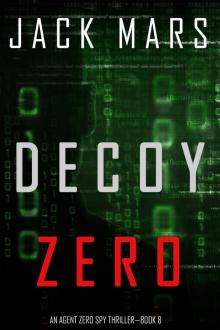 Decoy Zero
Decoy Zero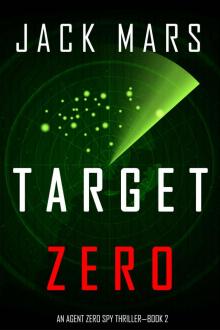 Target Zero
Target Zero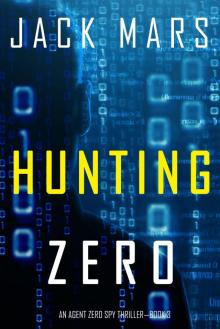 Hunting Zero
Hunting Zero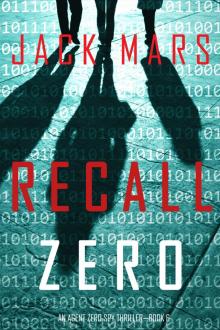 Recall Zero
Recall Zero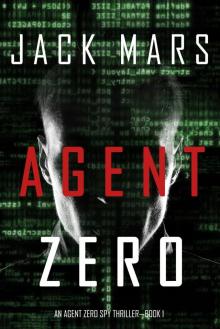 Agent Zero
Agent Zero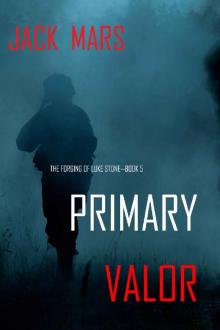 Primary Valor
Primary Valor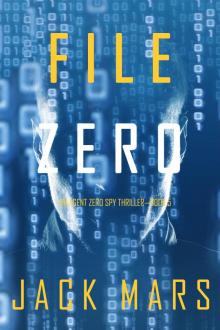 File Zero
File Zero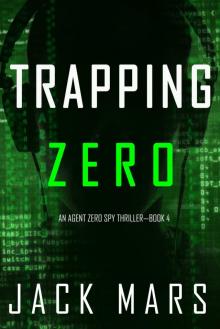 Trapping Zero
Trapping Zero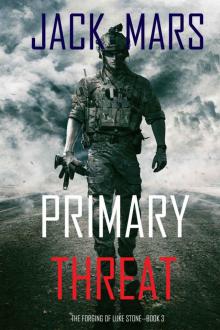 Primary Threat
Primary Threat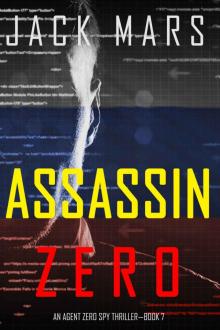 Assassin Zero
Assassin Zero Zero Zero
Zero Zero Zero Zero (An Agent Zero Spy Thriller—Book #11)
Zero Zero (An Agent Zero Spy Thriller—Book #11)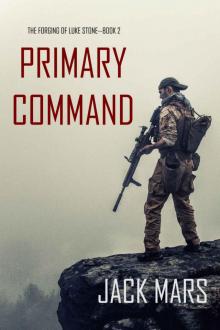 Primary Command
Primary Command![[Luke Stone 02.0] Oath of Office Read online](http://i1.bookreadfree.com/i/03/21/luke_stone_02_0_oath_of_office_preview.jpg) [Luke Stone 02.0] Oath of Office
[Luke Stone 02.0] Oath of Office House Divided
House Divided Oath of Office (a Luke Stone Thriller—Book #2)
Oath of Office (a Luke Stone Thriller—Book #2) Our Sacred Honor (A Luke Stone Thriller—Book 6)
Our Sacred Honor (A Luke Stone Thriller—Book 6)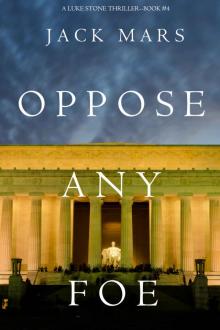 Luke Stone 04 - Oppose Any Foe
Luke Stone 04 - Oppose Any Foe Our Sacred Honor
Our Sacred Honor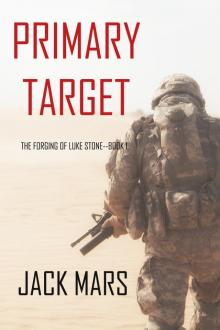 Primary Target
Primary Target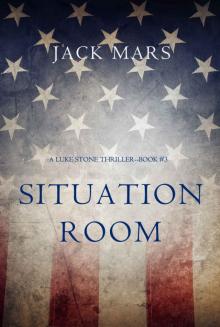 Luke Stone 03 - Situation Room
Luke Stone 03 - Situation Room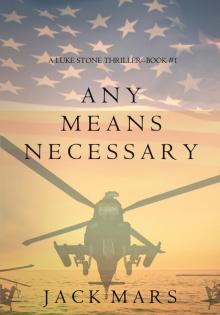 Any Means Necessary: A Luke Stone Thriller (Book 1)
Any Means Necessary: A Luke Stone Thriller (Book 1) Oath of Office
Oath of Office